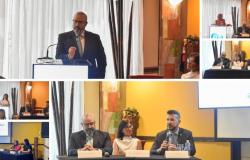
Ecuador ordered this Wednesday to suspend public and private work for two days in the face of the electricity crisis caused by a historic deficit in the reservoirs that supply the water plants, which led to blackouts of up to six hours and could bring million-dollar losses.
President Daniel Noboa decreed the “suspension of the working day” on Thursday and Friday, the presidency said in a statement, which attributed his decision not only “to environmental circumstances” but to “unheard-of acts of corruption and negligence.”
The municipalities of the port of Guayaquil and the Andean Cuenca, the main cities of the country after Quito, however announced that their public transport and airport services will continue to operate normally.
The mayor of Guayaquil, Aquiles Álvarez, stated in a statement that this commercial hub of the country produces about 70 million dollars a day. “We will not allow this to harm our economy,” he said.
Noboa declared an emergency in the electricity sector on Tuesday and requested the resignation of the then Minister of Energy, Andrea Arrobo. After untimely rationing last Sunday, Noboa on Tuesday entrusted the Energy portfolio to the head of Transportation and Public Works, Roberto Luque, and ordered an investigation into suspicions of corruption that affects electricity production.
The power plants will carry out maintenance on their plants on Thursday and Friday, which will imply rationing that will be announced in a timely manner, the presidency added.
Added to the water crisis is that Colombia stopped exporting energy to Ecuador as a measure to deal with the serious drought associated with the El Niño phenomenon, which has Colombian reservoirs below 30% of their capacity.
student protest
A group of students from the state Central University of Quito protested against the government, the blackouts and the Noboa referendum to confront organized crime, called for next Sunday. The university students set up shop in front of the University to raise slogans against the Executive and carry signs with legends such as “They cut off your electricity, cut off their support.”
The government, which announced that in April only 50% of households’ electricity bills will be charged, noted on Wednesday that the Mazar (the most important) and Paute reservoirs, both in the southern Andes, are in “critical conditions” at the moment. record storage levels of 0% and 4%, respectively.
Likewise, the flow in the largest hydroelectric plant, Coca Codo Sinclair (northern Amazon), with the capacity to generate 1,500 MW of power to cover 30% of national demand, suffers a 40% deficit with respect to the historical average.
Working days will be recovered in the public sector with an additional hour during the following working days, while in the private sector it will depend on the companies. Ecuador, with 17.7 million inhabitants, has an economically active population of 8.3 million people, according to official figures.
“Intentional concealment”
According to the government, the investigation arranged by Noboa produced “indications that high-level officials,” including Arrobo, “intentionally concealed information crucial to the functioning of the national energy system.”
The Executive maintained that “warnings and alerts to the Energy Crisis Committee were suppressed and undone, with the purpose that this serious situation is not known for timely decision-making.” In addition, he filed a complaint with the Prosecutor’s Office for paralysis of public service against 22 “saboteurs who sought to harm all Ecuadorians.”
The energy crisis affects the country on the eve of the popular consultation this Sunday, whose main axes are the fight against drug trafficking. Nearly 13.6 million voters are called upon to decide, for example, whether they agree with the extradition of Ecuadorians linked to organized crime.
The referendum also includes issues focused on strengthening the fight against organized crime through the participation of the Armed Forces, toughening penalties, eliminating prison benefits and equipping police and military with weapons confiscated from criminal gangs.
“They have wanted to scour us with sabotage in the electrical area, they have wanted to scour us with a dirty campaign (…) because they are nervous because the Yes is going to win,” Noboa said this Wednesday at an event in the Atacames resort.
In particular, citizens must decide whether they approve the permanent support of the Armed Forces to the Police against organized crime, without the need for a state of exception as is the case until now.
They will also have the possibility of reforming the penal code to increase penalties for crimes such as terrorism, drug trafficking, organized crime, murder, hitmen (murder for hire), human trafficking, kidnapping, extortion, arms trafficking, money laundering. and illegal mining.





